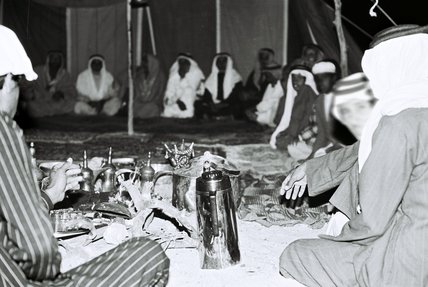Hospitality has long been associated with the majlis and seen as an essential part of Qatar's history and a pillar of public life. At every majlis, guests will find the host welcoming them warmly and inviting them in. In no time, the host will offer a fragrant cup of Arabic coffee (qahwa) that the guest simply could not refuse. There are several types of qahwa served at the majlis. The majalis (plural of majlis) were, and still are, found in every dwelling, whether as movable shelters or a more permanent structure within the house. People's enduring need for relaxation, entertainment, and the reception of guests, visiting family, and friends has resulted in the majlis's continued use.
Today, the majlis is still a place where family and friends gather for formal or informal occasions. A house usually has two majalis, one located inside the house and used as a women's majlis, and another often located in tents or smaller structures connected to the house for the men's gatherings.
The majlis is a system that presents customs, traditions, and norms as interconnected elements agreed upon by the people. Such elements are not written or documented but are passed down from one generation to another, depending on factors such as collectivism, verbal communication, and mutual recognition.
The oral tradition of passing such knowledge and customs is integral to the culture and has not stopped to this day. Popular forms of literature, especially poetry and proverbs, are considered to be the most secure and credible ways to transfer customs and traditions generationally. Hence, rituals surrounding the activities of the majlis that began centuries ago still exist today. The process of greeting guests, serving tea and coffee, providing meals, and burning incense are examples of some of the activities integral to a majlis.
